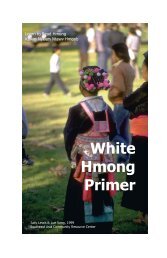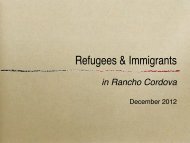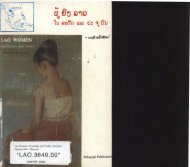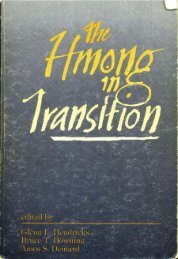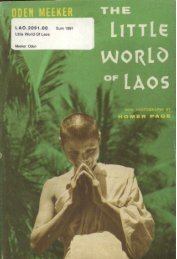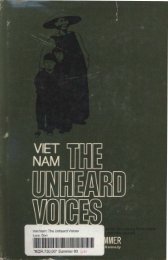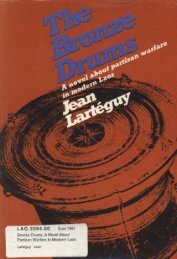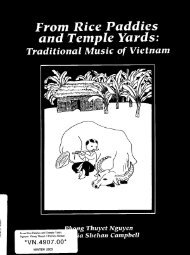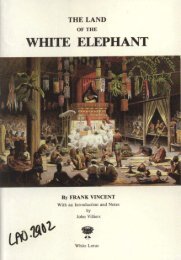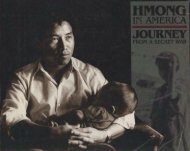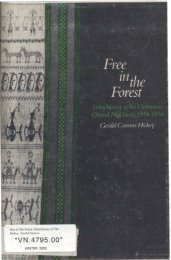PEOPLE
Grant, The Boat People - Refugee Educators' Network
Grant, The Boat People - Refugee Educators' Network
- No tags were found...
Create successful ePaper yourself
Turn your PDF publications into a flip-book with our unique Google optimized e-Paper software.
The Boat People<br />
by tht climate and the thriving economiesi of Houston and Dallaai-<br />
Fort Worth. Washington DC has somewhere between 8000 and<br />
20 000 (the figures are unclear, because many come to Washington<br />
for official reasons but do not stay), Louisiana 8300, Illinois 7W<br />
and New York 63Cll.<br />
The more recent refugees have in some ways gained, and in some<br />
ways been disadvantaged, by their later place in the arrival line. AS<br />
a group, they tend to be less educated and mined than the fistcomers,<br />
so they are easier to place in low-level jobs. They may have<br />
friends or relatives already in the country who will help them settle.<br />
Also, because thty have delibmtely escaped and have usually spent<br />
months, even years, in camps, they tend to expect less from resctdement<br />
services than the first wave. Yet they are sicker as well as pwrer<br />
than those who came before. Many suffer from malnutrition, skin<br />
infections, intestinal parasites and tuberculosis. California health<br />
officials havc reported isolated caws of leprosy and diphtheria<br />
among new refugees, Since their arrival, cases of typhoid fever have<br />
increased 92 per cent in Los Angtles and 58 per cent statewide.<br />
Also, Ameria's ailing economy, tight housing market and rising<br />
unemployment rate all work against the refugees' rtsettlemtnt<br />
attempts, Linked to this is the growing antagonism from America's<br />
own poor and displaced: the old cry that immigrants take local jobs<br />
and services is to be heard again, In Scadrift, a tiny fishing port in<br />
Texas, four years of simmering distrust Ween residents and<br />
rtsmled tefugtts wcr alleged poaching by Vietnamesc of crabtrapping<br />
sites erupted in July 1979 into open racial warfare. A setond<br />
serious incident ormrred a month later, when a riot broke out<br />
in a Spanish-speaking quarter in Denver, Colorado, which had been<br />
occupied in parts by Vietnamese refugees. Other anti-Vieu~amest<br />
outbursts around the country had the same ingredients: economic<br />
competition, and the belief, partly me, that the Vietnamtse were<br />
getting special welfare treatment from the government.<br />
Bjacks, who were among the first Americans to urge national<br />
action on khalf of the refugees;, have begun to show resentment.<br />
'A lot of blacks arc uptight,' said Mr John Robinson, director of the<br />
Martin Luther King community ccntre in the Washington suburb<br />
of Swth Arlington. 'It's the threat over jobs and housing. These<br />
people art the new niggtrs - they arc doing the work blacks don't<br />
'<br />
I<br />
want and getting their own shops, which a lot of blacks who've ken<br />
here all their lives can't get. They could have stayed in their own<br />
cuuntry and fought the system like we did, but thty chose to leave.'<br />
It is something of a double-bind for the bewildered refugees. If<br />
they fail to adjust, they are lambasted as a burden on the taxpayer,<br />
When they succeed, they arc accused of taking jobs w businesses<br />
away from native Americans,<br />
One Viemmese who has been in America long enough to assess<br />
thc resettlement experience is Colonel Nguytn Be, a former mth<br />
Vietnam% infantry officer who fled in 1975, the day after the US<br />
evacuation of Saigon. He had waited until the last minute, then<br />
hoarded a sampan and floated out to sea alone, leaving behind his<br />
wife and seven children, Now aged fifty, he was well known to<br />
Americans in Vittmm PI the inventor of Saigon's answer to the Vietcong<br />
- the black-pyjtrna-weping 'rural development cddn', which<br />
was intended to counter colonialism on the one hand, and communism<br />
on the other, by practising a 'revolutionary' form of Vianamcsc<br />
nationalism. Shirtless, literally, when he left Viemam, Colonel<br />
Be today wears button-down collars, thin-striped suits and carries<br />
a iiamsonite suitcase. During his four yean in America he has worked<br />
for various government refugee programs, first in New York and<br />
now in Washington DC, as a consultant for the depamnent of housing,<br />
education and welfare's Indo-China refugee task force,<br />
'The problem of w-cailed adjusting to the new society is not<br />
really that difficult for Vietnamese people,' Colonel Be said<br />
recently, 'We can accept. The problem for us, almost always, is<br />
being accepted, And many of the local communities have found<br />
that hard.' He spoke of the dccp cultural gaps which caused confusion<br />
on fira arrival.<br />
Amerks is a new orientation for the Vietnamese - s country run by laws,<br />
not by men. . . In Vietnam, you feel secure and prwd if yw havc your family<br />
around you and money in your pocket. Here, it is a new concept of security.<br />
There is nn family. You have to put the money in the bank. The security<br />
of yuur survival is the welfare benefit, the unrmpioyment and all the wial<br />
ewices. Until you realize that, it can be very frightening.<br />
Colonel Be explained that American and Viemaproperty<br />
were different.<br />
notions of




